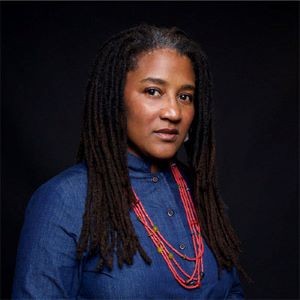Associate Professor Lynn Nottage in Conversation with Isabel Wilkerson

Associate Professor Lynn Nottage joined Isabel Wilkerson in conversation last week as part of the Brooklyn Academy of Music’s (BAM) series of virtual events. Nottage is a two time Pulitzer Prize-winning playwright and a screenwriter. Her plays have been produced widely in the United States and throughout the world. Nottage was first awarded the Pulitzer Prize for Drama in 2009 for her play Ruined, and received the honor again in 2017 for Sweat. She recently presented This is Reading, a performance and media installation at the Franklin Street, Reading Railroad Station in Reading, PA. Wilkerson is Pulitzer Prize-winning journalist whose writing has appeared in numerous publications. Her first book, The Warmth of Other Suns: The Epic Story of America's Great Migration, was awarded the 2010 National Book Critics Circle Award in Nonfiction, among other prizes. She was awarded the 2015 National Humanities Medal by President Barack Obama. Her newest book, and the departure point for the event’s discussion, is Caste: The Origins of Our Discontent.
“Caste is the bones, race is the skin,” Wilkerson writes. “Race is what we can see, the physical traits that have been given arbitrary meaning and become shorthand for who a person is. Caste is the powerful infrastructure that holds each group in its place.” Caste tracks the caste systems in America, India, and Nazi Germany as a means of investigating the historic legacies of each, and how they speak to each other. Nottage shared how much she appreciated not only the specificity of the book’s language, but also how Wilkerson incorporated her own personal narrative alongside the deep research she completed for the project. “Having this language right now, in a moment like this, has really helped me decode what’s happening in our country, and the way in which we are fracturing along racial lines.”
As Wilkerson noted, here in the United States, we have inherited a caste system from colonial times, and this centuries old hierarchy is the same one we are living under today. “I often describe this work that I have emerged with as kind of an x-ray of our country,” Wilkerson said. “And that x-ray shows us that we have an underlying infrastructure of division...essentially, a caste system is an artificial, arbitrary graded ranking of human value in a society.” This “graded ranking” determines—among other factors—access or denial of resources, as well as how people are treated and perceived in every aspect of their lives, whether it be the occupation they are expected to have, or the care they receive in the medical field.
This observation struck a personal chord with Nottage. “My mother grew up in Crown Heights in the 1940s and 50s and 60s, and she lived with her mother and her grandmother. My great-grandmother suffered a heart attack one day when she was coming home from shopping, in the vestibule of their house, and my mother was told to run across the street to the white doctor and ask him for help. My mother did that—she begged and pleaded for this white man to come to help her, and he refused to step into the house because she was a Black woman. My great-grandmother, who was in her early 50s, died right there...She died because she was a Black woman, and not seen as worthy of care. ”
Wilkerson noted how experiences like Nottage’s demonstrate the life and death stakes that exist under a caste system. “Those who have an investment in upholding the hierarchy,” Wilkerson said, “those who have absorbed the messaging of the hierarchy, make autonomic assumptions as to whether a person has value—whether a person is worth helping.” As Wilkerson noted, numerous empirical studies in the medical field show how incredibly dangerous false perceptions about Black and Brown individuals are still held and perpetuated to this day. Among them is the falsehood that Black and Brown people do not experience pain in the same way that whites do—the same racist logic behind the historical experimentation on enslaved women.
During the audience Q&A, one audience member asked Wilkerson to talk further about how we might bridge divides and create an environment of listening and healing. “There’s not a ten-point plan for overcoming this,” Wilkerson answered. “It’s so massive that it will take everyone and every system within our country to overcome a 400-year-old hierarchy that we still live under—that is so deeply embedded that it is autonomic and subconscious.” What people can do, in Wilkerson’s eyes, is enact what she refers to as radical empathy. “The problem with empathy as we often think of it, is that it can be an illusion. It can give us the illusion that we really understand something that we really don’t...Radical empathy calls upon people to be willing to do the work with a willing heart and an open mind.”
You can watch the complete conversation on BAM’s YouTube page.